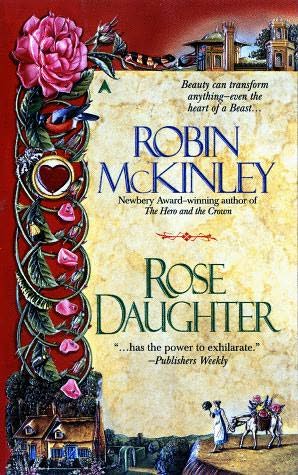
I have read and reread Robin McKinley's "Beauty" so many times. Her first novel, she takes the essence of the Villeneuve/Beaument story and fleshes out the characters. While it almost seems that Beauty is a little too resistant of living in a luxurious castle to be realistic, as one of the many girls guilty of getting too much pleasure out of material things, I always held Beauty as a role model.
Some elements may seem similar to the Disney version--the invisible maids are rather reminiscent of the enchanted objects (especially Mrs. Potts)- and these are the only versions I'm aware of where Beauty and the Beast are not alone in the castle. But the credit would go to McKinley for any creative ideas, since her book came out in 1978, and the Disney in 91.
Years later, in 1997, McKinley wrote another novel version of Beauty and the Beast, "Rose Daughter." In the author's note, McKinley describes how she came to do two different novel versions of the same story--she was asked to write a short story version of the tale for an artist to illustrate. At first she declined, already having written her own version of the story, but having learned more about gardening (and roses in particular) and having more ideas since her earliest novel, she decided to give it a go anyway. The short story turned into a novel.

"Rose Daughter" is also a good read, but for me it will never have the simple magic of "Beauty." The characters all basically have the the same personality (McKinley has loving sisters rather than the traditional fairy tale evil sisters). She adds several interesting elements, but it almost becomes too much. Between the nightmares, the dying roses, the prophecy of the three sisters, the episodes with the animals, the scenes changing from Beauty at the Beast's palace back and forth to her family back at home--the main plot is almost lost. Interestingly, though "Rose Daughter" is a longer book, in terms of actual conversations that Beauty and the Beast have, there are more in "Beauty." And isn't that the whole point of the story-the developing of their relationship?
The one thing I really love about this version and SPOILER DONT READ ANY MORE IF YOU WANT TO BE SURPRISED is how at the end, Beauty accepts the Beast the way he is, though he could have been transformed into a handsome man if she chose. Though the practicalities of being married to a Beast would be unfortunate if translated literally into real life, in most versions, the audience knows the Beast will become a handsome prince, so it almost cheapens the moral. Beauty is commended for loving the Beast for who he is and not for what he looks like, therefore...he becomes attractive. As if she loves him more when attractive, doesn't that therefore contradict the moral? And if she doesn't love him more when attractive, why is that the final reward?

No comments:
Post a Comment